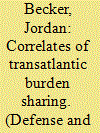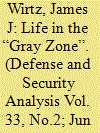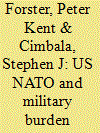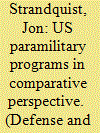|
|
|
Sort Order |
|
|
|
Items / Page
|
|
|
|
|
|
|
| Srl | Item |
| 1 |
ID:
154334


|
|
|
|
|
| Summary/Abstract |
While recent work has attempted to update the research agenda for transatiantic defense burden-sharing, there remain significant gaps between the public choice defense economics literature and the security studies literature. The presence of such a gap is unfortunate, because defense spending choices are likely shaped by factors identified by the public choice literature, as well as the strategic and cultural variables that the security studies literature tends to focus on, as well as domestic macroeconomic factors. The independent variables identified in recent qualitative literature are extremely useful analytically, and, fortunately, they have reasonable proxies in available quantitative data, which enables scholars to study them across large groups of countries and many years. This article builds upon such work to synthesize the most notable of the factors identified in the current literature, and offers some common analytical ground that will benefit both scholars and practitioners..
|
|
|
|
|
|
|
|
|
|
|
|
|
|
|
|
| 2 |
ID:
154335


|
|
|
|
|
| Summary/Abstract |
How have European cross-border defence industrial mergers and acquisitions affected domestic procurement bias among the major EU powers? This article departs from the findings of Andrew Moravcsik more than two decades ago suggesting that major West European states had no ingrained preferences for defence industrial autarchy. When cross-national armament projects were derailed, this could be attributed to political efforts of national defence industrial champions favouring purely domestic projects. As former national champions join pan-European defence groups, their preferences are likely modified. Does this shift procurement towards non-European “off-the-shelf” solutions which, according to Moravcsik, are favoured by defence departments? Or does it give impetus to a stronger preference for European as opposed to domestic systems? In this article, procurement patterns in the aftermath of cross-border defence industry consolidation will be analysed. Procurement bias is assessed in two industry segments characterised by pervasive consolidation.
|
|
|
|
|
|
|
|
|
|
|
|
|
|
|
|
| 3 |
ID:
154332


|
|
|
|
|
| Summary/Abstract |
The term “Gray Zone” is gaining in popularity as a way of describing contemporary security challenges. This article describes the “short-of-war” strategies – the fait accompli, proxy warfare, and the exploitation of ambiguous deterrence situations, i.e. “salami tactics” – that are captured by the term and offers several explanations for why state and non-state actors are drawn to these strategies. The analysis highlights why defense postures based on deterrence are especially vulnerable to the short-of-war strategies that populate the “Gray Zone.” The article concludes by suggesting how defense officials might adapt defense policies to life in the “Gray Zone.”
|
|
|
|
|
|
|
|
|
|
|
|
|
|
|
|
| 4 |
ID:
154336


|
|
|
|
|
| Summary/Abstract |
Possession of a brand is a sine qua non for economic success, not least because it connotes trust in delivering the value promised. Although Western arms exporters offer branded systems whose sales are influenced by price, there is a plethora of other economic variables, such as offset requirements and life-cycle support. Entrants to the international arms market will struggle without such arms “packages.” China’s entry, however, goes beyond the traditional economic paradigm. A four-stage historical model offers the backdrop for identifying the drivers that have forged its market entry into 55 countries worldwide. The strategy initially focused on sales of rudimentary military equipment for political purposes, but recently it has begun to commercialize exports, repositioning them from a low- to a high-tech sales trajectory. A Sino “brand” is thus emerging, reflecting both competitiveness and diplomatic considerations, especially non-interference in client state domestic affairs.
|
|
|
|
|
|
|
|
|
|
|
|
|
|
|
|
| 5 |
ID:
154331


|
|
|
|
|
| Summary/Abstract |
This work is about how the United States military has become dependent on networked technology. As arguably the largest contributor to national security, it has become so dependent that its chief doctrine integrates networked technology into nearly every specialty, with particularly intense focus on Network Centric Warfare. As the military’s old guard is replaced by the highly technical Millenial Generation, there is cause to pause when assuming this techno-acuity brings nothing but advantage and success. Vulnerabilities stemming from such extensive dependence offer opportunities for exploitation that have not gone unnoticed. The first step to moving forward from this point is to fully understand the extent to which the military has become dependent on computer networks. It might be the Millenials’ war today, but it would be quite unwise for the United States military to think about it and fight it in a purely Millenial way.
|
|
|
|
|
|
|
|
|
|
|
|
|
|
|
|
| 6 |
ID:
154333


|
|
|
|
|
| Summary/Abstract |
NATO burden sharing has become an especially timely issue in the past several years as a result of a number of factors, including Russian annexation of Crimea and destabilization of eastern Ukraine in 2014. This article argues that alliance unity among the great democracies of Europe and North America is indispensable to peace and stability on the Eurasian continent. A fractured NATO, and especially, a large divide in purposes or commitments as between the United States and its European security partners, invites aggression and the possibility of inadvertent escalation. Past successes and failures in US-involved multinational peace and stability operations, within and outside of Europe, show that mission accomplishment requires give and take, including the occasional acceptance of unequal costs and benefits among the members, in order to achieve peace and security objectives.
|
|
|
|
|
|
|
|
|
|
|
|
|
|
|
|
| 7 |
ID:
154330


|
|
|
|
|
| Summary/Abstract |
Assumed in the long-standing debate over which agency, CIA or the Department of Defense, should conduct US paramilitary operations is the idea that these organizations’ paramilitary programs are fundamentally the same kinds of things. This article questions that assumption by investigating the organizational forms underlying these agencies’ paramilitary programs in four empirical cases drawn from South Vietnam and post-9/11 Afghanistan. A typology is constructed around two identified organizational forms: “franchising” for CIA vs. “company ownership” for the US Army Special Forces. Different paramilitary organizational forms are found to have significant operational implications that should inform the paramilitary transfer debate.
|
|
|
|
|
|
|
|
|
|
|
|
|
|
|
|
|
|
|
|
|